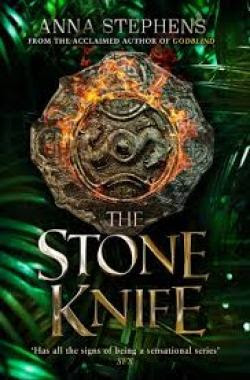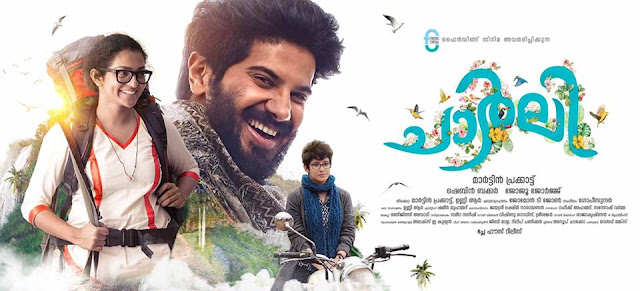The Stone Knife by Anna Stephens
After the blood-soaked finale to the Godblind series that saw Anna Stephens firmly being entrenched on to my pantheon of go-to-authors, for any thing fantasy (grim, dark and brutal) - I never thought she could top that with anything better. After all, this was the culmination of a tale, three books in the making with rogue gods and blood-thirsty gods meddling in the human affairs, a story crafted, honed and polished over a full series ending in a wholly satisfying manner. This time, she has turned her sights onto the Central American myths and blended all of that into her own vision of a terrifying epic of clashing faiths, warring humans and monstrous blood-thirsty Gods in this new book, called The Stone Knife, first in the series, Songs of the Drowned.
The forests of Ixachipan have been clashing with the sounds of battle, forever now. The Pecha empire wants to awaken the world-spirit by conquering the lands of Ixachipan and the only deterrent against this mighty ambition are the last two tribes, that refuse to give in. The Tokob and Yalotlan. The season of the Wet is upon the world and the armies of the Empire are tired, looking to withdraw back to their capital. The capital, the Singing City though, is very much the pit of the vipers, where their God, an individual anointed to be the 'Singer', keeps the Magic alive through his Song that resonates throughout all the lands they have conquered, amplified by Pyramids built in his honour.
Back in the Sky City - the Tokobs who live in harmony with nature, resent this Pechacan invasion as they feel their society is built on a strict caste system, they waste resources and force tribes into indenture and slavery to work on their own lands or are pressed into military servitude to help these greedy politicians war against their own co-tribes. The Tokobs consists of the Shamans who are able to converse with their ancestors-spirits and their Gods (Malel, the Goddess who provides for them, akin to the Land they reside on and the Jaguar and the Snake) to bring wisdom back to the tribe. Then there are the warriors, Paws trained to fight and defend their lands, and lastly there are the Ejab. A special caste of warriors, deaf who use sign-language to communicate, and who are trained to fight against these monstrous creatures called Drowned who reside in their lakes and rivers. These utterly despicable creatures live in the water and hunt down any humans, unfortunate enough to come close to them, either for sport or food. Ejabs are assigned the important task of fetching water back into the city, trained alongside their dogs to do this, simultaneously warding off the Drowned as they fetch water.
The story is told through multiple POVs spread through the book, giving us a balanced view of both the Empire and the resistance. Xessa is an ejab, a Tokob warrior dedicated to her cause of serving her tribe. Fend off the Drowned, bring water back. A young girl who's also just about discovering the joys of falling in love, with her fellow ejab Toxte. But her sham of a peaceful existence is shattered when war reaches the borders of Tokob lands. Her best friend, Tayan a shaman, is one of the two peace-weavers who are sent on this perilous mission right into the heart of the enemy land, to negotiate a peace-treaty to avoid the loss of lives. Lilla, a Jaguar warrior, and sworn-husband to Tayan, is concerned about his love's safety on this mission as he knows the Pecha are the masters of deceit and his naive husband is little too trusting of human nature. But other than protect his home-land, there is little else that he can do.
In the capital of the Empire of Songs, we meet the Singer himself, through the chapters of Etne, a highly ambitious politician who has insinuated herself right into the Singer's private court and gained his highest favor. Etne is the one who receives the peace-weavers but has no intention of actually brokering anything meaningful. And then we have Pilos, a war-weary military commander within the Empire, who is tasked with this impossible task of conquering these last two tribes, whatever be the cost. Through him, the gory battle-scenes come alive as we see the Pechacan battle-machinery grind through the defences of the tribes.
In The Stone Knife, Anna Stephens has built a whole new world, full of heart headlined by well-rounded characters we believe in, a world full of unexpected danger around every corner of the jungle, a world built on beliefs and fascinating traditions as old as Gods themselves. Anna has deftly juxtaposed two different clashing faiths to be the root of all the conflict. There is no black or white here, just men and women driven and inspired by what they believe in deeply and passionately. For the Pecha, it's their sustained belief in the power of the Song that will help awaken the World Spirit while the tribes believe in nature, their dieties are as inspired by nature, chiefly Malel, their Goddess of the Hill and the animals, Jaguar or the Snake. And this fundamentally opposing beliefs leads them into war, a brutal no-holds barred invasion that splits up into manifold bloody scuffles through the wet treacherous jungles, or marshy swamps, in the rains and across hills/rivers.
Let's face it, life is hard in this world. It's grim and survival at all costs is the main driver for the tribes. For basic necessities like water itself, they are dependent on the terrain - be it rain or the rivers. But water itself means extreme danger. For apart from the predators that roam the lands, the Drowned who thrive in water are a particularly vicious form of predators that craves human flesh.
The magic system is slightly similar to the Godblind series - in terms of the power coming to humans, through contact with the spirit-world or their Gods. But the concept of the 'Song' was something I found fascinating and original.
While this book isn't squarely within grim dark territory, there is quite a bit of violence, considering this book is mainly about a political invasion almost featuring themes like a cultural genocide. Including a few scenes that feature slavery or torture - you been warned but not new grounds considering Anna Stephens' previous books. Her writing style has definitely evolved here, being a pleasing mix of fervent intensity for the battle scenes as the clash of steel and cries of pain echoes around you, then switching to the slow, measured tone of quite introspection as the warriors mull on the consequences of their violent actions and plan ahead. Anna effortlessly brings in the themes of disability and diversity, without overtly referring to the same. For example, Xessa is a warrior, not a girl warrior. Tayan's and Lilla's same-sex marriage and relationship is the norm, not an exception. The Ejabs are born deaf - but this becomes an advantage for them in their fight against the dreaded water-monsters who have the ability to mesmerise people with their songs. The characters' motivations are real, dragging us readers down with their emotions. My heart went out for Xessa, especially. If you asked me to pick a favourite, that would be her. Well, after Ossa the best dog ever, of course.
The similarities exist from her previous body of work, in that Anna definitely believes in putting her characters through the grinder. Even here, the obstacles faced by the Tokobs like Tayan the shaman or Xessa the Ejab warrior are Sisyphean in nature. Several heart-stopping moments in there! The chapters, especially that of Etne's, take on a compelling quality - completely mesmerising as we watch Etne, the ambitious political animal that she is, play her cards right to get to her final machinations. Some of the later chapters are stomach-churning horrifying, but I was glued onto the pages, devouring the story as it build up to its feverish climactic scenes. I sat and finished the last hundred and fifty odd pages at one-sitting, completely immersed into this brutal ancient mythical world as battles raged on.
Will the Song prevail? What of the resistance fighters like Xessa, Tayan and their allies? What about the clear fractious internal turmoils within the Singer's court itself? Questions abound. But there are no simple answers as intentions and ambitions collide and twist, terrifying secrets about Gods and monsters are revealed and magic of The Stone Knife will completely blow you away. The first book in this series, is one of the most immersive epic fantasy I have read this year and easily among my top three of the year.
A terrifying tale of clashing faiths, spirit-magic, gods and monsters in a brilliantly realised world reminiscent of the ancient Mayans or the Incans, Anna Stephens has outdone herself with this opening sequence of a series, which I have no doubt, will become an epic fantasy masterpiece of storytelling.




Comments